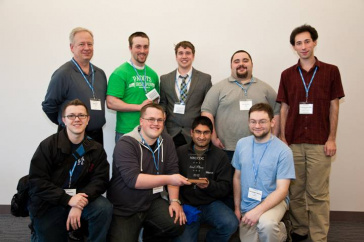Lights Out at UNH for New Environmental Effort

The UNH Wildhats computer security team celebrates its second-place win at the Northeast Collegiate Cyber Defense Competition recently. Front, left to right: Chris Hutchins, Alex MacPherson, Pavan Natti, Chris Neveu. Back, left to right: coach Ken Graf, David Fitzpatrick, Bryan Bickford, Sam Galletta, Frank Kreimendahl. Credit: Heratch Photography
At the University of New Hampshire, "Friday night lights" has taken on a new meaning that has nothing to do with football. Instead, it's a grassroots environmental effort called Friday Night Lights Out in which students gather at the start of the weekend to turn off lights and other appliances left on in academic buildings.
Launched by undergraduates active in several campus environmental groups, the weekly event is simple yet effective. Any lights or projectors left on in classrooms on Friday night, the students say, likely will burn throughout the weekend. Switching them off saves the university money and reduces wasted electricity. Working with the UNH Energy Office, the students have calculated their efforts are saving the university approximately $200 per week.
"It's a small but important step in helping UNH achieve 100 percent clean energy by 2020," says Joseph Van Gombos '12, a political science major and honors program student who is active in UNH's Climate Action Network, a coalition of environmental groups on campus, and the new student group Net Impact. Other student groups involved in Friday Night Lights Out are the Student Environmental Action Coalition (SEAC) and the UNH Energy Club.
Conceived by CAN's Ben Trolio '12, an honors program student and environmental conservation studies major, the effort has been gaining in popularity since its launch in January 2012. This past Friday night (March 23, 2012), 25 students wearing t-shirts announcing "UNH does it in the dark" met at the SEAC office in the MUB then divided into four groups that each targeted three or four buildings.
The students track valuable building information on spreadsheets, noting locked buildings, inaccessible light switches, and broken motion sensors along with how many lights and projectors they turned off. By sharing this data with the UNH Energy Office, they can assist in upgrading building monitoring systems and, perhaps, influence behavior among building occupants. "I guess it's our goal to go out of business," says Vincent Lyon '12, a mechanical engineering student and co-president of the UNH Energy Club.
"It is great to have students committed to this effort, as it both targets buildings where we do not have automated controls to power down lighting and equipment and it increases awareness of the economic and environmental benefits of reducing energy consumption," says Matt O'Keefe, director of the Energy Office. "Any effort that is initiated and carried out by the students illustrates the passion that exists on campus for energy saving initiatives."
Friday Night Lights Out welcomes additional volunteers. The students meet in room 139 in the MUB each Friday night at 5:15 p.m.
The University of New Hampshire, founded in 1866, is a world-class public research university with the feel of a New England liberal arts college. A land, sea, and space-grant university, UNH is the state's flagship public institution, enrolling 12,200 undergraduate and 2,300 graduate students.
-30-
Photographs available to download:
/unhtoday/news/cj_nr/2012/mar/bp29lights01.jpg
Caption: Vincent Lyon '12 saves energy in Hamilton Smith Hall during a recent Friday Night Lights Out at the University of New Hampshire.
Credit: Lisa Nugent, UNH Photographic Services
/unhtoday/news/cj_nr/2012/mar/bp29lights02.jpg
Caption: University of New Hampshire students prepare to save energy at a recent Friday Night Lights Out at the University of New Hampshire.
Credit: Lisa Nugent, UNH Photographic Services
Latest News
-
July 2, 2024
-
June 18, 2024
-
June 18, 2024
-
May 17, 2024
-
May 14, 2024

















































